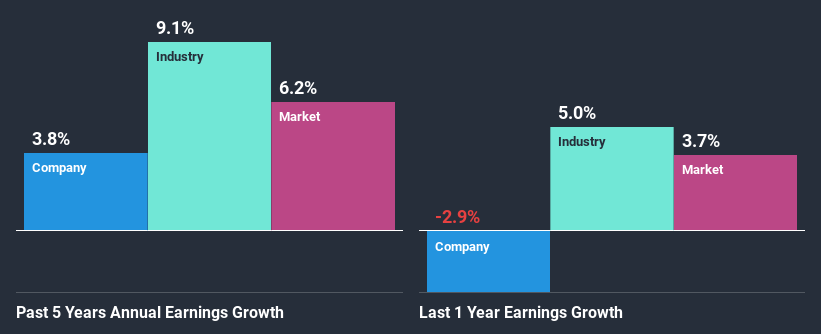- Taiwan
- /
- Electronic Equipment and Components
- /
- TWSE:2373
Are Aurora Corporation's (TPE:2373) Mixed Financials The Reason For Its Gloomy Performance on The Stock Market?
It is hard to get excited after looking at Aurora's (TPE:2373) recent performance, when its stock has declined 3.4% over the past month. It is possible that the markets have ignored the company's differing financials and decided to lean-in to the negative sentiment. Fundamentals usually dictate market outcomes so it makes sense to study the company's financials. Specifically, we decided to study Aurora's ROE in this article.
ROE or return on equity is a useful tool to assess how effectively a company can generate returns on the investment it received from its shareholders. In simpler terms, it measures the profitability of a company in relation to shareholder's equity.
View our latest analysis for Aurora
How Is ROE Calculated?
ROE can be calculated by using the formula:
Return on Equity = Net Profit (from continuing operations) ÷ Shareholders' Equity
So, based on the above formula, the ROE for Aurora is:
18% = NT$1.5b ÷ NT$8.1b (Based on the trailing twelve months to September 2020).
The 'return' refers to a company's earnings over the last year. So, this means that for every NT$1 of its shareholder's investments, the company generates a profit of NT$0.18.
Why Is ROE Important For Earnings Growth?
Thus far, we have learned that ROE measures how efficiently a company is generating its profits. Based on how much of its profits the company chooses to reinvest or "retain", we are then able to evaluate a company's future ability to generate profits. Assuming all else is equal, companies that have both a higher return on equity and higher profit retention are usually the ones that have a higher growth rate when compared to companies that don't have the same features.
A Side By Side comparison of Aurora's Earnings Growth And 18% ROE
At first glance, Aurora seems to have a decent ROE. On comparing with the average industry ROE of 9.9% the company's ROE looks pretty remarkable. Yet, Aurora has posted measly growth of 3.8% over the past five years. That's a bit unexpected from a company which has such a high rate of return. We reckon that a low growth, when returns are quite high could be the result of certain circumstances like low earnings retention or poor allocation of capital.
As a next step, we compared Aurora's net income growth with the industry and were disappointed to see that the company's growth is lower than the industry average growth of 9.1% in the same period.

Earnings growth is an important metric to consider when valuing a stock. What investors need to determine next is if the expected earnings growth, or the lack of it, is already built into the share price. Doing so will help them establish if the stock's future looks promising or ominous. What is 2373 worth today? The intrinsic value infographic in our free research report helps visualize whether 2373 is currently mispriced by the market.
Is Aurora Making Efficient Use Of Its Profits?
With a high three-year median payout ratio of 91% (or a retention ratio of 9.5%), most of Aurora's profits are being paid to shareholders. This definitely contributes to the low earnings growth seen by the company.
In addition, Aurora has been paying dividends over a period of at least ten years suggesting that keeping up dividend payments is way more important to the management even if it comes at the cost of business growth.
Conclusion
On the whole, we feel that the performance shown by Aurora can be open to many interpretations. Despite the high ROE, the company has a disappointing earnings growth number, due to its poor rate of reinvestment into its business. Wrapping up, we would proceed with caution with this company and one way of doing that would be to look at the risk profile of the business. To know the 2 risks we have identified for Aurora visit our risks dashboard for free.
When trading Aurora or any other investment, use the platform considered by many to be the Professional's Gateway to the Worlds Market, Interactive Brokers. You get the lowest-cost* trading on stocks, options, futures, forex, bonds and funds worldwide from a single integrated account. Promoted
New: Manage All Your Stock Portfolios in One Place
We've created the ultimate portfolio companion for stock investors, and it's free.
• Connect an unlimited number of Portfolios and see your total in one currency
• Be alerted to new Warning Signs or Risks via email or mobile
• Track the Fair Value of your stocks
This article by Simply Wall St is general in nature. It does not constitute a recommendation to buy or sell any stock, and does not take account of your objectives, or your financial situation. We aim to bring you long-term focused analysis driven by fundamental data. Note that our analysis may not factor in the latest price-sensitive company announcements or qualitative material. Simply Wall St has no position in any stocks mentioned.
*Interactive Brokers Rated Lowest Cost Broker by StockBrokers.com Annual Online Review 2020
Have feedback on this article? Concerned about the content? Get in touch with us directly. Alternatively, email editorial-team (at) simplywallst.com.
About TWSE:2373
Aurora
Provides office automation equipment, office furniture, communications, cloud HR, 3D printer, and office cloud and electronics in Taiwan, China, and internationally.
Excellent balance sheet average dividend payer.
Market Insights
Community Narratives



